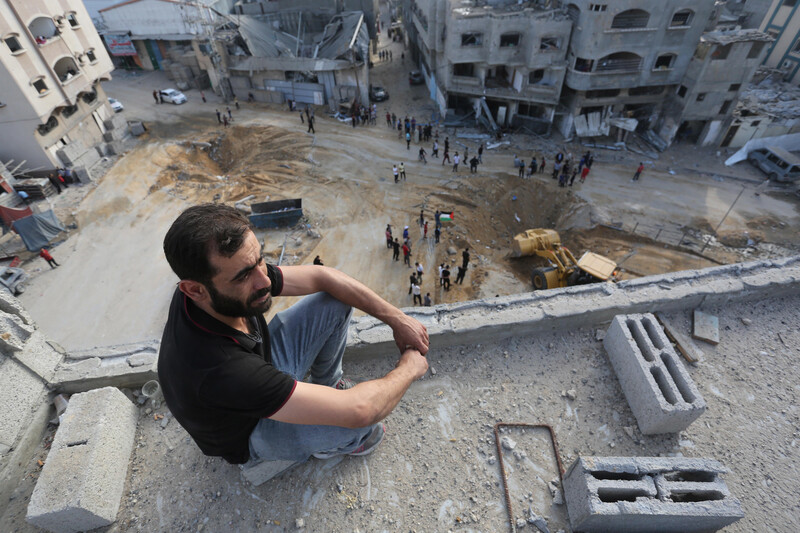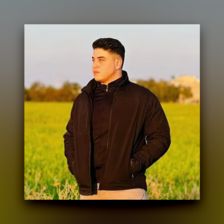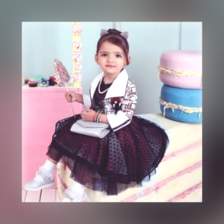The Electronic Intifada 26 June 2024

A man looks out over Jabliya refugee camp after yet another night of heavy bombing in May.
APA imagesWe have heard a lot about the ethnic cleansing of 1947-49 and the bitter experience of displacement for two-thirds of the Palestinian people during the Nakba that has been well documented by now.
In raw numbers, Israel’s genocide over the past nearly nine months has displaced more people, an estimated 1 million as compared to the 850,000 back then, even if as a percentage of the total population, it is still less.
But iIt has happened to my family, despite our desire to stay in our home in Jabaliya in the northern Gaza Strip.
On 7 October, six houses in the neighborhood were bombed, including those of friends. They had left the area before I could say goodbye to them. (I have to believe that I will see them again when the genocide ends. But we thought it would have been over by now.)
Our house had been teeming with displaced relatives on both my father’s side and my mother’s. There was no privacy, and the rooms had too many people sleeping in them.
The food rations were tiny because of the large number of people needing to be fed. Water was scarce. Electricity outages meant we had to heat water over a fire to take a shower. We also cooked on the fire because Israel prevented the entry of cooking gas,
This was a more primitive life than the human mind can imagine.
But even to die in our home would not be our fate .
Forced to leave
Instead we were dispersed, like so many others.
My first displacement came on 20 November 2023. All those leaving our house headed to my aunt’s house elsewhere in Jabaliya. There were other displaced people who had preceded us. We stayed in that house for three days and four nights.
On the morning of 24 November 2023, a truce went into effect.
Many of us thought that the war was over. We were filled with happiness, and we returned to our homes. But because the Israeli army did not withdraw from all our areas despite the truce, some people remained displaced in the homes of relatives or in schools and shelters.
Then, after only six days, the truce ended, and the Israeli attacks returned, even more harshly.
On 1 December 2023, the bombing in our area began again, at around 7 in the morning. The sounds of the explosions were more powerful than before. Israeli jets began dropping gas and white phosphorus bombs in our area.
We didn’t know whether we should leave or stay. We had not prepared bags or the necessary papers that we needed to take if we did leave. Eventually, we decided to go. The bombs were falling in front of us, and we tried to take cover along narrow alleys, to avoid shrapnel and missiles.
After some heart-stopping moments, we arrived at the house of another of our relatives, still in Jabaliya.
The house was filled. There were about 60 people, and we all had to bear the overcrowding and the scarcity of food.
But we could not bear the intensity of the bombing. A shell hit the house next to us, demolishing a wall in the house we were in, and leaving a number of the neighbors martyred.
My group decided to leave again, not knowing our next destination, simply trying to stay one step ahead of death. Every house we reached seemed to get surrounded by Israeli tanks a day or two after our arrival.
Finally, we decided to head west.
We searched for shelter, but we did not find anything available. Most of the houses were destroyed. Eventually, we decided to hunker down in an UNRWA school.
“Month of torment”
We stayed there for a month — a month in one room with four families, with barely any water or food or other basic necessities
It was a month of torment. It was a month of dying while alive.
I don’t really know how it passed, but it did. We survived.
When the Israeli army withdrew forces from northern Gaza, we returned home.
Fortunately, our house was only “partially” destroyed. There were no doors or windows. Glass and bullet marks were scattered everywhere. Blackness drowned the place.
We tried to restore the house and settled in again.
Life was hard. We paid unimaginable sums for flour and animal feed, on which we relied for food.
No one was satisfied. The pain, heartbreak and torment continued. But some normalcy did return, more food was allowed to reach areas of the north, and the bombing gradually eased. We thought that the war was over in the north, especially in Jabaliya.
But by May it became clear that the Israeli military had no intention of leaving the north alone.
On 11 May, the Israeli military dropped leaflets ordering yet another evacuation from Jabaliya. We resisted as long as we could, but, as the bombings intensified yet again, on 23 May we reluctantly picked up some belongings along with our pain and distress and went to the al-Saftawi area, still in the north.
There we found shelter with other displaced relatives in an apartment that already held three families.
Our share is a whole room. I see it as great luck to get a room for my family – my father, mother, brother, two sisters and myself – even though it contains just one bed and a window without glass.
The temperatures are high, heat burns our skin, and insects are everywhere.
We don’t sleep much because of the heat. We often stay up all night.
How can we endure more displacement?
How can we endure more pain?
How can we endure more killing?
Asil Almanssi is a writer based in Gaza.





